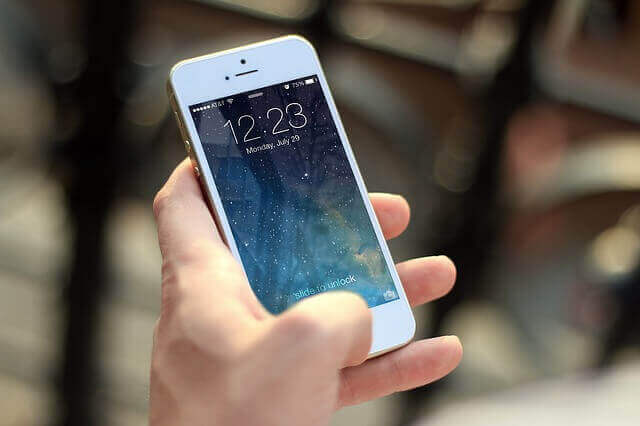Should Kids Use Their Phone in School?


Reviewed and approved by the psychologist María Alejandra Castro Arbeláez
The new generations have been born with screens and phones. While this can be a good thing, it also has its negative consequences. Many parents and teachers ask themselves if kids should use their cell phones in school.
There are voices in favor, and there are voices against it. We’ll talk about both sides of this argument in this article.
Reasons for kids to not use their phone in school
This is one of the options that you might choose regarding whether or not kids should use their phone in school. It argues that using phones in school has negative effects on learning since it’s a distraction. Therefore, students can’t concentrate as well.
Some of the consequences of kids using their phone in school are:
1. Lack of discipline
Many teachers say that it’s becoming more and more difficult for children to pay attention in class. That’s because they’re too distracted by their cell phones. Some students even wear earbuds and don’t listen to their teachers.
2. Less concentration
Paying attention to their phones reduce students’ ability to learn and hear what the teacher has to say. Many students play, send messages or interact on social media when they should be focusing.

3. Sedentary lifestyle
Not only are cell phones harmful in class, but also at recess. Unlike past generations, nowadays, playgrounds are full of “zombie” children staring at screens.
Kids don’t want to play with balls, jump rope, play hide and seek, or play hopscotch. This leads to a sedentary lifestyle. In fact, it continues at home, and can cause health problems.
4. Behavior problems with kids who use their phone in school
Jealousy and envy appear as soon as cell phones become a symbol of status among students. If a student shows his friends his older phone, or if he doesn’t have one, he’ll be considered an outsider or inferior.
Additionally, there are many cases of bullying in children who don’t have the same technological devices as the others.
“Not only are cell phones harmful in class, but also at recess. Unlike past generations, nowadays, playgrounds are full of ‘zombie’ children staring at screens.”
Reasons for kids to use their phone in school
On the other hand, there are some parents and teachers that think it’s beneficial for kids to bring their cells phones to class.
Why? Because they need to be prepared for adult life where everything revolves around screens. Additionally, they can use their technology to study better.
However, for this theory to work, children must use their phones correctly, and use them only for learning.
Of course, students shouldn’t be using their phones to send messages and check their social media. On the contrary, they should use the internet to find information, images, or whatever they need to participate in class.
If cell phones were used educationally, they could be great tools for learning. In fact, they would help both students and teachers alike. If children know how to work them perfectly, why not take advantage of them to improve education?
Learn language, use a calculator, define an unknown word, do homework faster, read a specific text, research a particular topic… there are many ways to take advantage of phones in class.

This idea in favor of using phones at school explains that you should integrate new technologies, not ignore them. Most students are very familiar with technology. In fact, maybe that’s why it’s so hard for them to pay attention to a chalkboard or read a physical book.
If you look for fun ways to use phones for education instead of demonizing screens in general, classes would be more fun and effective. Learning by playing and with good tools is a great way to teach young students nowadays.
Could this actually work?
For this resource to really work, parents need to help their children learn the difference between play time and study time, even if kids use their phones for both. This is a very big challenge, especially since adults are also inseparable from their phones.
However, kids should learn a different lesson: you can have fun without a bright screen in front of your face. There are times where it’s better to keep your phone in your bag and spend time with your world around you, using all five of your senses.
All cited sources were thoroughly reviewed by our team to ensure their quality, reliability, currency, and validity. The bibliography of this article was considered reliable and of academic or scientific accuracy.
- Graner, C., Beranuy, M., Sánchez-Carbonell, X., Rosell, M. C., & Lusar, A. C. (2006). ¿Que uso hacen los jóvenes y adolescentes de internet y del móvil? Comunicación e Xuventude:
- González, M. A., Fernández, M. V., Urturi, A. F., Bregón, B. H., Moreno, M. M., & Molinero, L. R. (2015). Uso y riesgos de las tecnologías de la información y comunicación en adolescentes de 13-18 años. Acta Pediátrica Española, 73(6), 126–135.
- Botija, F. G. (2019). La prohibición del teléfono móvil en las escuelas en Francia. Revista de administración pública, (208), 379-401. https://dialnet.unirioja.es/servlet/articulo?codigo=6889947
- Rodríguez, O. T. (2020). Uso del smartphone en centros escolares privados: una cuestión de responsabilidad social. ZER: Revista de Estudios de Comunicación= Komunikazio Ikasketen Aldizkaria, 25(48). https://ojs.ehu.eus/index.php/Zer/article/view/21553
- Rueda Chulde, D. A. (2018). Uso de teléfonos móviles y su incidencia en el rendimiento académico en los estudiantes de primeros de bachillerato general unificado del colegio fiscomisional san Francisco, ciudad de Ibarra, año lectivo 2015-2016 (Bachelor’s thesis). http://repositorio.utn.edu.ec/handle/123456789/7941
This text is provided for informational purposes only and does not replace consultation with a professional. If in doubt, consult your specialist.
